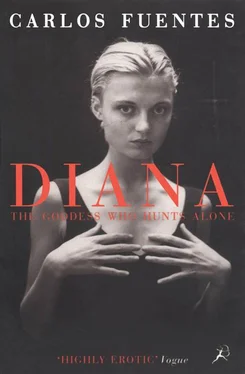Carlos Fuentes - Diana the Goddess Who Hunts Alone
Здесь есть возможность читать онлайн «Carlos Fuentes - Diana the Goddess Who Hunts Alone» весь текст электронной книги совершенно бесплатно (целиком полную версию без сокращений). В некоторых случаях можно слушать аудио, скачать через торрент в формате fb2 и присутствует краткое содержание. Год выпуска: 2012, Издательство: Bloomsbury UK, Жанр: Современная проза, на английском языке. Описание произведения, (предисловие) а так же отзывы посетителей доступны на портале библиотеки ЛибКат.
- Название:Diana the Goddess Who Hunts Alone
- Автор:
- Издательство:Bloomsbury UK
- Жанр:
- Год:2012
- ISBN:нет данных
- Рейтинг книги:3 / 5. Голосов: 1
-
Избранное:Добавить в избранное
- Отзывы:
-
Ваша оценка:
- 60
- 1
- 2
- 3
- 4
- 5
Diana the Goddess Who Hunts Alone: краткое содержание, описание и аннотация
Предлагаем к чтению аннотацию, описание, краткое содержание или предисловие (зависит от того, что написал сам автор книги «Diana the Goddess Who Hunts Alone»). Если вы не нашли необходимую информацию о книге — напишите в комментариях, мы постараемся отыскать её.
Diana the Goddess Who Hunts Alone — читать онлайн бесплатно полную книгу (весь текст) целиком
Ниже представлен текст книги, разбитый по страницам. Система сохранения места последней прочитанной страницы, позволяет с удобством читать онлайн бесплатно книгу «Diana the Goddess Who Hunts Alone», без необходимости каждый раз заново искать на чём Вы остановились. Поставьте закладку, и сможете в любой момент перейти на страницу, на которой закончили чтение.
Интервал:
Закладка:
One day, though, Azucena noticed that Diana’s fingers no longer followed the shape of her face. Instead — Azucena saw it by coming closer — they drew something else over it. She didn’t want to alarm her. Curious, she observed her for several days, concerned, trying to figure it out. With her finger, the woman was drawing over her face the exterior landscape of the chimneys. She wanted the world. She wanted to create it. She could reproduce it only as an invisible tattoo on her face in a misted-over mirror.
Inside, she was dead. Her interior death preceded her exterior death. The men she was with were, at best, her guards, her jailers. They also used drugs. She saw them as friends one day, enemies the next. She’d run away from them to pick up total strangers outside the hotels near the big train stations — the Gare de Lyon, Austerlitz, the Gare du Nord. The stations for anonymous businessmen, traveling light. Who were they? That was the point: no one. Sex without baggage, nothing that would truly enter her life, because she let nothing go and excess baggage was very heavy and very expensive …
“She simplified her life so much that at the end she was only eating dog food.”
No one would give her work. She imagined a strange movie — Azucena told me that afternoon in Barcelona, sitting in a café on the Ramblas — in which nothing happened but in which everything happened at the same time. There were four simultaneous scenes, with no people, just places, colors, sensations. One place was a desert. That was Mexico. Another place was pure stone. That was Paris. Another place was lights — many, many lights. That was Los Angeles. Another place was snow and night. That was Iowa. She wanted to bring them together in a film, and only then, when all of them were joined, would she enter the picture.
“Know something, Azucena? Now I’m going to go back and see for the last time each one of the places where I’ve lived.”
That was the last thing Diana said to her.
XXXIV
Toward the end of the 1970s, I ran into Diana in a Paris restaurant. She smiled at me fixedly but didn’t recognize me. She was like a dead woman whose eyes hadn’t been closed. Her smile was meant for no one in particular. Her stare was out of phase with the objects before it. A zombie with swollen flesh. A miserable body. A malnourished beauty. I had a useless feeling that I couldn’t keep from overwhelming me. Might I have helped her? Was I in some way guilty for what I was seeing and what was looking at me without recognizing me? Would only a Midwestern boy have made her happy forever? Is there a part of life that won’t let itself be purified? I have no explanation for the inexplicable. But neither does the world.
XXXV
A few years later, I took a nonstop flight from Los Angeles to New York. I had just given a series of lectures at some California colleges and decided to reward myself with the luxury of a first-class seat on a jumbo jet so I could sprawl out comfortably for the six-and-a-half-hour flight. There were very few people in first class. After we were all seated, an airline official escorted a splendid woman to the first row. She passed in a cloud of perfume that conjured both Olympus and the jungle: a black woman in a short skirt, with long legs, perfect thighs, marvelous breasts, but a maternal belly, the belly of a goddess of the subjugated earth of Africa and America. Her tensed neck emblematized and betrayed all the cares, fears, and timidity of this lioness, which is what she was, crowned with an animal mane the colors of a sunflower — copper, red, blond, black, pubic.
Of course I knew who it was: Tina Turner. What I noticed was her pain, her modesty, which dissipated any air of stardom, any undeserved arrogance. Her veiled eyes said to themselves, I have no right to all this, but I deserve it. She didn’t apologize for her fame, but she preferred that we share, at least in the anonymity of travel, the human meaning of her songs. She snuggled up next to the window, took off her shoes, and put on her sunglasses; a gracious stewardess covered her with a vicuna blanket — soft, infinitely swaddling, maternal, protecting the singer from the sound and the fury, caressing her with the sweet drowsiness of fatigue.
I didn’t want to stare at her too much; I didn’t want to be curious or impertinent. I thought of the song Diana Soren listened to so often—“Who Takes Care of Me?”—and, looking at the sleeping lioness wrapped in her own skin, I admired, with painful tenderness, the strength of this humiliated, beaten, cheated-on woman who overcame her troubles without taking revenge on her tormentors. Without asking for the death or the imprisonment of anyone, earning, on her own, the right to be herself and to change the world with her voice, her body, and her soul, without sacrificing any of the three. Her art, her race, her spirit … Poor Diana, so strong that she had no defense against the weaknesses of the world. Marvelous Tina, so weak she learned to defend herself against all the powers of the world …
XXXVI
I went to Iowa only many years later, while on a lecture tour in the Midwest. Whenever she’d ask me, “Help me re-create my hometown,” I would tell her I couldn’t: “I have nothing to do with that.” “You’ve seen it in movies,” she said, teasing me for my amateur cinematographic erudition. That’s why I know — I retorted — that the small town in the movies is always the same small town. It’s been there at M-G-M since time immemorial, the town where Mickey Rooney captivated all the girls in high school and put on plays in the barn. Main Street with its signs: barbershop, soda fountain, Woolworth’s, the local newspaper, the church, and the town hall standing in for the saloon and whorehouse of the heroic era. I told her that all that stuff she and I believed in was invented by Jewish immigrants from Eastern Europe who, out of gratitude, wanted to construct an ideal image of the United States as perpetually bucolic, peaceful, innocent. A place where boys on bicycles delivered newspapers, where sweethearts held hands on porch swings, and where the universe was an immense perfectly mowed lawn, perfectly open and limited only, perhaps, by that white fence Tom Sawyer painted.
When my friends from the University of Wisconsin took me to Iowa in 1985, I discovered that the myth was real, although it was impossible to know if the town had imitated Hollywood or if Hollywood was more realistic than we thought. The courthouse, a neo-Hellenic building with cornices and blindfolded statues guarding the steps of justice, presided over life in Jeffersontown. Main Street was exactly what I expected: low buildings on each side, shoe stores, drugstores, a Kentucky Fried Chicken with the ubiquitous Colonel Sanders, a McDonald’s, and a bar.
“The high school. Don’t leave out the high school,” she would say.
“But I’ve never been there. I’ve got nothing to do with that. How do you expect …?”
The boys still meet to drink beer in the tavern. They’re tall and strong. They talk about what they did that Saturday when I was in Diana’s hometown. They went out to hunt raccoons. It was the young men’s favorite sport. That carnivore, native to North America, has a difficult Algonquin name, arahkun, and a prodigious nocturnal life. Its fur is grayish-yellow, its tail has black rings on it, it has small erect ears and almost human hands, thin as those of a pianist. But its face is a black Venetian mask that disguises it so it can climb trees more easily. It’s omnivorous, but it washes everything before eating it, and, disguise on top of disguise, it makes its den in hollow trees. Masked raccoon: it sleeps in winter but doesn’t really hibernate. It delivers its litter, of up to half a dozen little raccoons, in only sixty days. Young, it’s pleasant and playful; old, it’s as irascible as a solitary grandfather. It eats everything — eggs, corn, melons. It’s the scourge of the local farmers, who hunt it down. The fiery old ones know how to escape, but the young ones fall more easily. Young or old, however, they turn fierce when cornered. In the water, they’re dangerous — they can drown their enemies.
Читать дальшеИнтервал:
Закладка:
Похожие книги на «Diana the Goddess Who Hunts Alone»
Представляем Вашему вниманию похожие книги на «Diana the Goddess Who Hunts Alone» списком для выбора. Мы отобрали схожую по названию и смыслу литературу в надежде предоставить читателям больше вариантов отыскать новые, интересные, ещё непрочитанные произведения.
Обсуждение, отзывы о книге «Diana the Goddess Who Hunts Alone» и просто собственные мнения читателей. Оставьте ваши комментарии, напишите, что Вы думаете о произведении, его смысле или главных героях. Укажите что конкретно понравилось, а что нет, и почему Вы так считаете.












